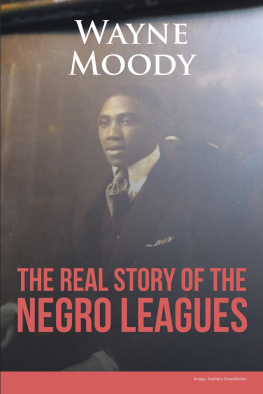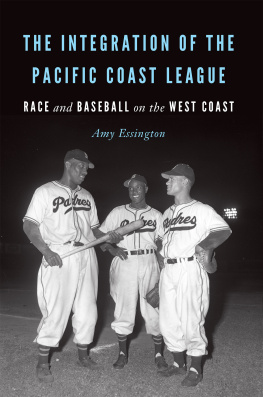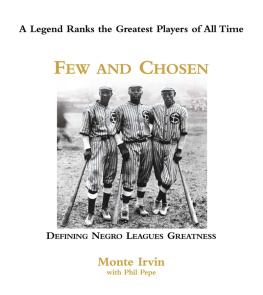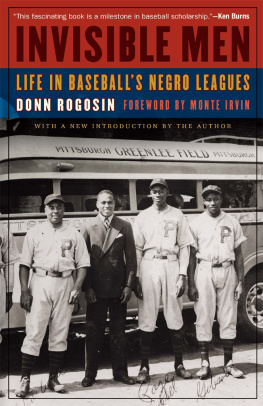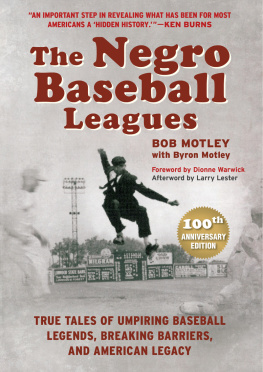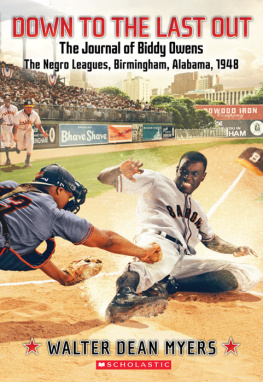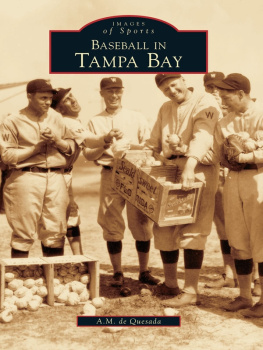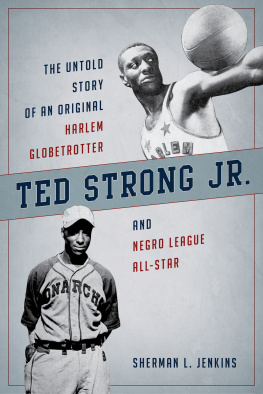Chapter 1
The Greatest Man Ive Ever Known
M y grandfather used to always talk to me about the Negro Leagues. He understood it was an important part of history, a portion of history he helped to create. Whether it was the players, the chronicles, or the tremendous discrimination the players endured, he was remarkably always correct and on point. Years of research has shown me that virtually everything he told me was accurate. Most of the information included in this book came directly from him. Let me tell you the story about my grandfather.
To many, August 28, 1898, is just another date on the calendar. However, for me, it was a day that would eventually mold me into the man I am today. This was the day Willis J. Moody, my grandfather, was born.
He began his early life in Clarksburg, West Virginia, a bustling blue-collar town. As a kid, if there was a ball involved, he would excel. He was a star in football, basketball, track and field, and baseball. He enjoyed the competition and freedom these sports provided. Make no mistake though, baseball was the love of his life. From the manicured ball fields to a grassy meadow, Willis was always there, honing his skills and playing the game with smooth precision.
He attended Kelly Miller High School in Clarksburg. That school quickly fell out of favor with him, when administrators told him he couldnt play on the athletic teams, because of the color of his skin. Being a great student wasnt enough for my grandfather; he wanted to play the games he had enjoyed his entire young life. Willis never let any obstacle block the road to his desired destination. He transferred to Sumner High, where he set records in all four sports.
In addition to playing in high school, he also played baseball for some of the independent teams in the area, with players nearly twice his age. The players simply called him, The Kid. He was rapidly making a name for himself, as a speedy hard-hitting outfielder with instincts that cant be taught. He was a natural.
Playing for the independent teams in Clarksburg exposed my grandfather to a variety of scouts. He played a game against a team from Pittsburgh. Reverend Harold Tinker, an outstanding infielder in the Negro Leagues, played for that team. He witnessed Willis Moody hit, run, and throw the Clarksburg team to a lopsided victory. When Reverend Tinker returned to Pittsburgh, he told Cumberland Cum Posey about this one-man wrecking crew from Clarksburg. Cum brought Willis to Pittsburgh and got him a job at US Steel. He didnt want him in the mill where he could hurt his hands, so he got him a job in the office. He was the only man of color working in the office at that time.
Initially, my grandfather played for the Pittsburgh Keystones. At nineteen years old, he played with other greats like Hap Allen, Dizzy Dismukes, Harold Morton, Ernest Gooden, Jap Washington, Buddy Clay, Harry Salmon, and Willie Gray. Dizzy Dismukes, the manager, brought in the cream of the crop. This was a team that was every bit as good as the Grays during this time frame.
Just like his early days in Clarksburg, he became a star. It wasnt long before Cum Posey brought him over to the Homestead Grays. In addition to the Grays, he played in Cuba, Venezuela, Puerto Rico, and many other exotic locales. Willis Moody became a hired gun, while playing for many teams all over the world. However, his athletic prowess was secondary to the man he had become.
The Grays were playing in Chester, Pennsylvania, one day, when this beautiful and sassy woman caught my grandfathers eyes. Emily was a woman who, lets just say, had a strong mind of her own. Willis introduced himself after the game and promptly asked her out to dinner.
Emily said, My father told me not to get involved with ballplayers.
Willis told her, I was just hungry and wanted some company. You do eat, dont you? The comment brought a smile to her face, and she accepted.
Emily became my grandfathers queen, and eventually they were married, enjoying a lifelong torrid romance. They used to go to the beach in Atlantic City. Sandals werent good enough; he would carry her on his shoulders so the hot sand wouldnt burn her feet. This was the type of caring individual he was at all times.
When I was four years old, I used to watch baseball with my grandfather in an enormous reclining chair. It reminded me of the huge chair Lily Tomlin would be sitting in when she played the little girl on Laugh-In . He would point out the things I should do and the bad habits that I should never let into my game. When I was big enough where a baseball glove wouldnt fall off my hand, my grandfather would play Over the Wires with me. He would take a rubber ball and throw it over the telephone wires. He made me turn my back and run to a spot before looking for the ball. Many times, the rubber ball bounced off my head. After I finally mastered the technique, I didnt think any more about it. When I went to my first Little League practice and showed this skill, all my coaches marveled. I thought, This is just Over the Wires . My grandfather watched that practice and just smiled.
When I began playing Little League, I was just nine years old. Playing against kids that were eleven and twelve was a challenge, but because of what my grandfather taught me, I could hold my own. In an all-star game, I faced a big left-hander who, in my estimation, was seven feet tall. He threw a pitch that rode up and in. The ball hit me square in the chest. Stunned, I could actually taste blood in my mouth. I was thinking, Thats enough baseball for me . Later that day, I was watching Wide World of Sports with my grandfather. It was a televised bullfight. He looked me square in the eye and said something I would never forget. He said, The bull is fierce, but with the red cape, the bullfighter isnt afraid to dance with the bull. It took a while to sink in, but I finally realized he was telling me not to be afraid of the ball. He never raised his voice, but when he spoke, it was profound.
My grandfather taught me a tremendous work ethic. He told me, You may lose, but dont ever let it be because someone outworked you. These are words that guide my life to this day. I used to race my grandfather every week when I was young. I was fourteen before I could beat him in a foot race. Truthfully, I never did outrun him. When I came within an eyelash of beating him, he never raced me again. He simply smiled and nodded.
After starring in Negro League baseball, my grandfather, along with my other grandfather, Ralph Lefty Mellix, formed a semipro team called 18 th Ward. It represented the 18 th Ward in the city of Pittsburgh. It was made up of players from the community of Beltzhoover. It featured players with Major League talent, like Roland Big Luke Lucas, Paul Wysong, Whitey Turner (who was often the backup catcher for Josh Gibson), and Newty Brown. They always battled a team that was also made up of former Negro League players, Terrace Village. The championship game usually pitted Sammy Streeter against Ralph Lefty Mellix. There would be a thousand fans at these games, drinking, cheering, and rooting on their neighborhood team. Bob Prince, the iconic announcer for the Pittsburgh Pirates, often attended these games. He would usually pass the hat, for people to contribute to pay the umpires and provide adult refreshments to the lively fanatics.
I went away to college and played baseball at Gannon University. We had a great team. Midway through the season, we were scheduled to play in Pittsburgh against Point Park, the number one NAIA team in the nation. My grandfather was there to cheer me on. We were down 5-3 in the final inning. I came to the plate with the bases loaded.

